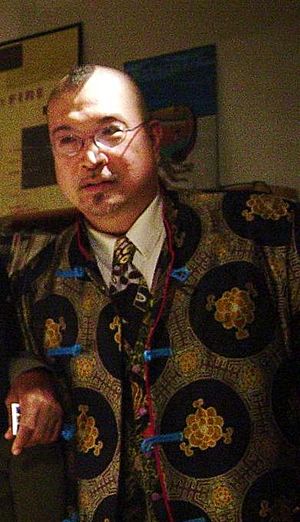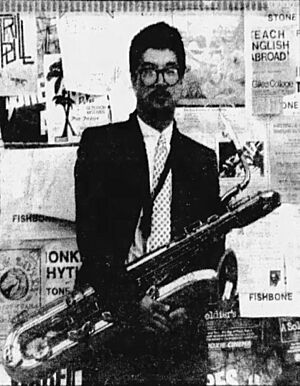Fred Ho facts for kids
Fred Ho (Chinese: 侯维翰; pinyin: Hóu Wéihàn; born Fred Wei-han Houn; August 10, 1957 – April 12, 2014) was an American jazz musician. He played the baritone saxophone. Fred Ho was also a composer, a leader of music groups, a writer, and an activist who worked for social change.
Contents
About Fred Ho
Fred Ho was born in Palo Alto, California. When he was six years old, his family moved to Massachusetts. In 1988, he changed his last name to "Ho."
Fred Ho was known for his unique musical style. He often combined different kinds of music. He believed that music should be respected, especially African-American music. He felt that the word "jazz" was sometimes used in a way that was not respectful to this music.
He wanted to understand what made "Asian-American music" special. He asked, "What makes Chinese American music truly Chinese American?" He thought that music by an Asian American artist should really show Asian American culture. For example, he said that a cellist like Yo-Yo Ma is a great musician who happens to be Chinese American, but his music isn't necessarily "Chinese American music."
Music and Activism
Fred Ho was also an activist. This means he worked to bring about social change. Many of his musical works blended sounds from traditional Asian and African music. He wanted his music to be a true mix of cultures.
He believed that music could help bring people together. He thought it could show respect for different cultures. His goal was to use music to promote equality among people.
Fred Ho also helped create several groups for Asian Americans. These included the East Coast Asian Students Union and the Asian American Arts Alliance in New York City. He also helped start the Asian American Resource Center in Boston.
His Unique Musical Style
Fred Ho was of Chinese descent. He was famous for mixing different musical traditions. He would combine tunes that might not seem to fit together at first. Many people described his music as both brilliant and exciting.
He was the first person to combine Chinese opera with traditional African-American music. He led two music groups: the Afro Asian Music Ensemble, which started in 1982, and the Monkey Orchestra, which began in 1980. He lived in Greenpoint, Brooklyn, New York.
Fred Ho studied sociology at Harvard University and earned his degree in 1979. He recorded music for labels like Koch Jazz and Soul Note. Some of his later works included Deadly She-Wolf Assassin at Armageddon and Voice of the Dragon I, II, and III. He wrote many musical pieces, plays, and books. Some of his early CDs were Monkey I, Monkey II, and The Underground Railroad to My Heart.
His Ideas About Art
In his 2000 book, Legacy to Liberation, Fred Ho shared his ideas about art. He wrote that art should inspire people to be brave and proud. He believed art should make people feel strong and human. It should not make them feel calm, confused, or numb.
He thought that art could fill us with love, hope, and new ideas for a better world. He felt that artists play an important role in helping people understand society. Artists can show how things really are and help people think about change.
Later Life and Awards
On August 4, 2006, Fred Ho was diagnosed with colon cancer. After treatment, he felt better, but a second tumor was found in 2007. He wrote two books about his experience with cancer: Diary of a Radical Cancer Warrior (2011) and Raw Extreme Manifesto (2012).
Fred Ho received many awards and grants for his work. These included support from the National Endowment for the Arts and the Rockefeller Foundation. In 1996, he won an American Book Award. He also received a Guggenheim Fellowship and the Harvard Arts Medal in 2009. In March 2014, shortly before he passed away, he received the Lynette Velasco Community Impact Award from the Harlem Arts Festival. He was also the youngest person to receive the Duke Ellington Distinguished Artist Lifetime Achievement Award.
Fred Ho passed away on April 12, 2014, at his home in Brooklyn, New York. He was 56 years old.
Discography
- 1985: Tomorrow is Now (Soul Note)
- 1985: Bamboo That Snaps Back (Finnadar)
- 1987: We Refuse to be Used and Abused (Soul Note)
- 1988: A Song for Manong (Asian Improv)
- 1993: The Underground Railroad to My Heart (Soul Note)
- 1996: Monkey Part I (Koch Jazz)
- 1997: Monkey Part II (Koch Jazz)
- 1997: Turn Pain Into Power (O.O. Discs)
- 1998: Yes Means Yes, No Means No, Whatever She Wears, Wherever She Goes (Koch)
- 1999: Warrior Sisters (Koch)
- 2001: Once Upon a Time in Chinese America (Innova)
- 2009: Celestial Green Monster (Mutable Music)
- 2011: Year of the Tiger (Innova)
- 2011: Snake-Eaters (Big Red Media)
- 2011: The Sweet Science Suite: A Scientific Soul Music Honoring of Muhammad Ali (Big Red Media)
With the Julius Hemphill Sextet
- Five Chord Stud (Black Saint, 1994)
Books edited by Ho
- Sakolsky, Ron, and Fred Ho. Sounding Off! Music as Subversion/Resistance/Revolution. Brooklyn, NY: Autonomedia, 1996.
- Ho, Fred. Legacy to Liberation: Politics and Culture of Revolutionary Asian Pacific America. Oakland, CA: AK Press, 2001.
- Ho, Fred and Bill V. Mullen. Afro Asia: Revolutionary Political and Cultural Connections between African Americans and Asian Americans. Durham, NC: Duke University Press, 2008.
Books about Ho
- Fujino, Diane C., ed. Wicked Theory, Naked Practice: A Fred Ho Reader. Minneapolis, MN: University of Minnesota Press, 2009.
- Buckley, Roger N., and Tamara Roberts, ed. Yellow Power, Yellow Soul: The Radical Art of Fred Ho (Asian American Experience). Champaign, IL: University of Illinois Press, 2013.
See also
 In Spanish: Fred Ho para niños
In Spanish: Fred Ho para niños
 | Aaron Henry |
 | T. R. M. Howard |
 | Jesse Jackson |



